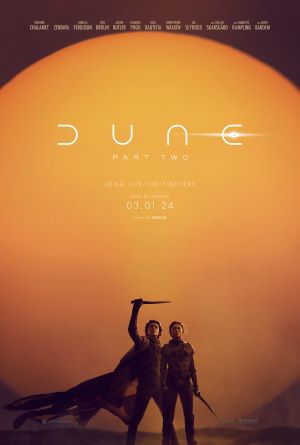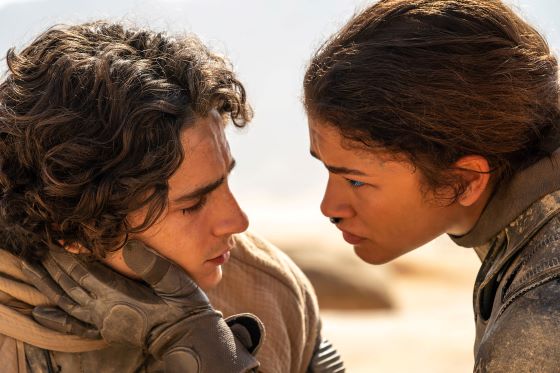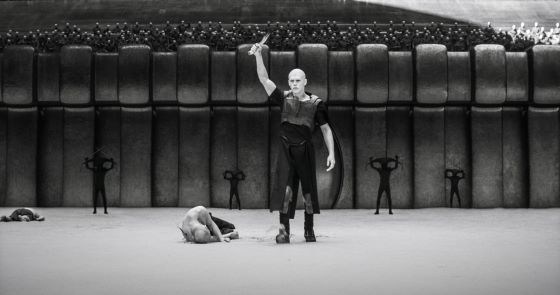

[Rating: Solid Rock Fist Up]
In Theaters Friday, March 1
Kind of like a rock concert that blasts the enamel off your teeth despite an overzealous and extended version of “Moby Dick” halfway through, Dune: Part 2 is the full, blissful, challenging, comprehensive, and exhaustive artistic experience. A mesmerizing visual feast brimming with the absolute cream of Hollywood’s current acting crop, the follow-up to 2021’s stunning reimagining of Frank Herbert’s classic book doesn’t cut any narrative corners, even if it does snip a few emotional ones.
Part 2 picks up the story minutes after the end of the last installment, with Paul Atreides (Timothée Chalamet) fighting alongside his new Fremen allies against the treacherous Harkonnen. In the last movie, it was Baron Harkonnen (Stellan Skarsgård) and his nephew, Rabban (Dave Bautista), who acted as the tip of the spear for the coup that led to the death of Paul’s father and the ruin of House Atreides. Two of just a handful of people to have survived the purge, Paul and his mother, Lady Jessica (Rebecca Ferguson), employ a mix of ancient prophecy and raw charisma to convince the traditionally independent Fremen to join the fight against the Harkonnen and their silent partner, the Emperor (Christopher Walken).
This second installment tracks Paul’s journey from reluctant leader to willing revolutionary, with a broadening of the larger narrative’s scope to incorporate more of the universe’s sociopolitical and religious landscape. There’s several new characters to meet as a result, including Baron Harkonnen’s handsomer yet equally evil nephew, Feyd-Rautha (Austin Butler), the Emperor, and the Emperor’s daughter, Princess Irulan (Florence Pugh). All of them have an important part to play in the ever-evolving story, which moves through prophecy, premonition, and politicking with deliberate precision.

The story is a complex one full of rich history that fills hundreds of pages in the book series, yet director Denis Villeneuve once again succeeds in distilling the narrative down to its most essential, digestible components. At 167 minutes, some of the headier bits that deal with Paul’s internal conversations with his unborn sister sometimes tax a viewer’s patience, yet none of it feels extraneous, and it all comes across as of a piece with the larger story and the themes of both installments. Villeneuve expects the viewer to keep up without too many prompts, and while the swerves out of the central story into Irulan’s journals or Lady Jessica’s hallucinations can be disorienting, the broad strokes of what’s going on are easy enough to follow.
This is, after all, a story about space-Jesus actually giving in to his baser nature, bypassing crucifixion, and instead getting sweet, sweet revenge with the help of his mother: the newly crowned desert Witch-Pope. It’s weird, sure: but it isn’t terribly complex when boiled down to the basics. Along the way Paul must balance his growing connection to the Fremen and his new Boo, Chani (Zendaya), against his familial duties/destiny (genocide-flavored though they may be according to his acid trips….err…spice visions).
And while the second act of Part 2 does bow and stretch a bit when struggling to carry the weight of the story’s two ends, it holds strong: albeit at the expense of any deep or lasting emotional investment into these characters. Indeed, there’s never any real doubt about what decision Paul is going to make, here, and while his and Feyd-Rautha’s circling of each other is exciting, the fact that there’s no question about their eventual clash and how this will end takes a little iron out of the movie’s glove.

That said, it’s hard to care much about that with all the worm riding, knife fighting, and the general bad-assery of Austin Butler as the new big bad, here. Bald Evil Elvis sinks his teeth into the role, going full, unfiltered, gleefully evil a-la Gary Oldman in The Professional, or Gary Oldman in The Fifth Element, or Gary Oldman in True Romance or Gary…well, you get the idea. This is just a bad man doing mean things with a genuine pep in his step, and the movie soars every time Butler struts into it.
Villeneuve deserves the majority of the credit for pulling all of this off, though, as he’s taken a story that’s both familiar by way of imitation, and foreign insofar as all the complex prophecy and politics, and made it equally fresh and accessible. Special effects blend seamlessly into deliberate sequences that don’t look re-worked to death and pair deliciously with set design, costume, and hair/makeup work that lends credibility to the look and feel of the story. Indeed: it’s been about 2 and a half years since the audience was last in Arrakis, yet the opening minutes of Part 2 make a viewer feel like they never left.
Chalamet sometimes comes across as listless in the maelstrom of his own story’s active hurricane of events, yet the script doesn’t give him much to do other than brood and worm-ride, so it’s hard to fault the guy. Likewise, the film feels very much like the second part of a three-headed story that needs the closure promised here in Part 2. Like the first one, this stings only as much as demanded by a movie so good that one can’t help but to crave more of the same: a true accomplishment for something just a bit under 3 hours long. Even so, none of this ever takes away from the fun of this propulsive story, which is set in a rich world with real, lived-in characters doing some gnarly and never-dull shit.





Comments on this entry are closed.